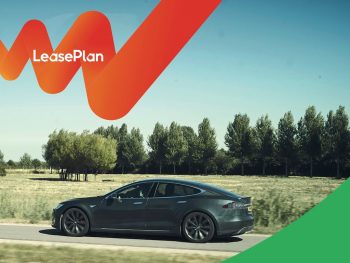Corporates have ‘small window’ to electrify fleets, LeasePlan warns
Corporates have a small window of time to electrify their fleets and help prevent the worst effects of climate change.

While corporate fleets are today a significant contributor to transport emissions, their electrification would represent a giant step forward towards a net zero world
Highlighting how we “owe it to our children and grandchildren not to waste this opportunity”, a new LeasePlan white paper gives a call to action for fleets to commit to EVs ahead of the pivotal COP26 meeting in November.
The crux of the ‘Road to COP26: How corporate fleets can fight climate change’ report is that the majority of new cars sold in Europe are company cars – six out of 10 cars sold in Europe are company cars, with petrol and diesel vehicles still accounting for 96% of new company car registrations in 2019.
This means that while corporate fleets are today a significant contributor to transport emissions, their electrification would represent a giant step forward towards a net zero world.
In addition, company cars drive on average 2.25 times further than private cars.
Therefore, LeasePlan says corporate fleets can therefore “either disappointingly contribute to climate change, or be a major part of the solution”.
Tex Gunning, CEO, said: “Corporate leaders should take full responsibility to fight climate change, and switching to an electric fleet is one of easiest and most effective ways to make an impact. If we can get a decent plan in place by the time COP26 starts in November, we will have a real chance to eliminate emissions from road transport and play our part in limiting global temperature rises to 1.5°C.”
The white paper also sets out that emissions reductions from EV adoption are already measurable on a global scale. Since 2000, global transport emissions had been rising by 1.9% per year; but in 2019, they increased by less than 0.5%. The difference, it says, is due to improvements in efficiency, greater use of biofuels and the increase in EVs.
LeasePlan also warns that while latest climate science indicates that, to avoid the worst climate impacts, carbon emissions must be cut by 45% by 2030, UN analysis shows emissions could actually rise by 16%, leading to a temperature increase of 2.7°C above pre-industrial times – irreversibly and negatively impacting life on Earth
LeasePlan has committed itself to achieving net zero emissions from its total funded fleet by 2030, and is a founding partner of The Climate Group’s EV100 initiative, which promotes EV uptake among the world’s largest companies.
Earlier this month, as part of World EV Day 2021, LeasePlan commited to setting science-based GHG reduction targets across all emission scopes to prevent the most dangerous effects of climate change and to align with the emissions reduction pathways of the Paris Agreement.
Speaking then, Tex Gunning said: “The only way to fight climate change is by setting clearly defined and measurable science-based targets – and we call on other responsible global corporations to do the same and align their ambitions with the latest climate science. The IPCC’s recent report shows without any doubt that we are facing an urgent and existential climate emergency so the time for action is now.”
To access the LeasePlan report, click here.







